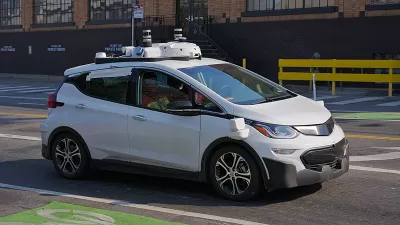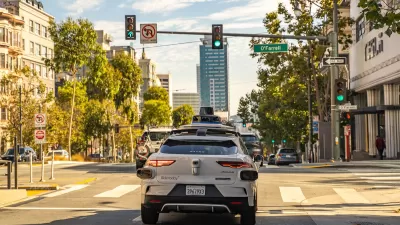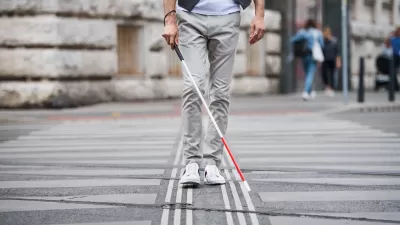Autonomous vehicle technology is no longer enjoying an uncritical reception. Skepticism, it seems, is becoming a more common response to the idea of setting robot cars free on the streets.

According to an article by Jeremy Kahn, pedestrians behavior continues to challenge researchers and engineers working on automated vehicle technology. That "burning issue" could be impacting the viability of the technology.
The message communicated by some engineers: you're crossing the street wrong. Or, as Andrew Ng puts it in the article, "Please be lawful and please be considerate."
Since an Uber self-driving car struck and killed a pedestrian in Arizona earlier this year, some safety advocates have questioned whether automated vehicles should be on the road if they can't guarantee the safety of pedestrians. Angie Schmitt's take, written shortly after Kahn's article, calls out the autonomous car industry for trying to shift blame on jaywalkers and trying to reprogram the public realm to suit the shortcomings of autonomous vehicles technology.
Kahn raises one additional interesting point, which is to say the article implies some doubt that autonomous vehicles are as viable as the technology's boosters would have the world believe. Kahn points to the struggles of Uber and Teslas as examples of the industry "losing steam." The New York Times also echoed that new doubt about the viability of self-driving technology, referencing Uber specifically in an article published yesterday.
Kahn also adds questions about other companies racing to beat everyone to the autonomous vehicle market: "Google’s Waymo has promised to launch a self-driving taxi service, starting in Phoenix, Arizona, later this year, and General Motors Co. has pledged a rival service—using a car without steering wheel or pedals—some time in 2019. But it’s unclear if either will be capable of operating outside of designated areas or without a safety driver who can take over in an emergency."
FULL STORY: To Get Ready for Robot Driving, Some Want to Reprogram Pedestrians

Maui's Vacation Rental Debate Turns Ugly
Verbal attacks, misinformation campaigns and fistfights plague a high-stakes debate to convert thousands of vacation rentals into long-term housing.

Planetizen Federal Action Tracker
A weekly monitor of how Trump’s orders and actions are impacting planners and planning in America.

San Francisco Suspends Traffic Calming Amidst Record Deaths
Citing “a challenging fiscal landscape,” the city will cease the program on the heels of 42 traffic deaths, including 24 pedestrians.

Defunct Pittsburgh Power Plant to Become Residential Tower
A decommissioned steam heat plant will be redeveloped into almost 100 affordable housing units.

Trump Prompts Restructuring of Transportation Research Board in “Unprecedented Overreach”
The TRB has eliminated more than half of its committees including those focused on climate, equity, and cities.

Amtrak Rolls Out New Orleans to Alabama “Mardi Gras” Train
The new service will operate morning and evening departures between Mobile and New Orleans.
Urban Design for Planners 1: Software Tools
This six-course series explores essential urban design concepts using open source software and equips planners with the tools they need to participate fully in the urban design process.
Planning for Universal Design
Learn the tools for implementing Universal Design in planning regulations.
Heyer Gruel & Associates PA
JM Goldson LLC
Custer County Colorado
City of Camden Redevelopment Agency
City of Astoria
Transportation Research & Education Center (TREC) at Portland State University
Jefferson Parish Government
Camden Redevelopment Agency
City of Claremont





























